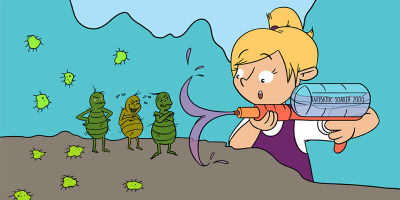
In articles about infections and medicines, you may have come across words such as superbugs and drug resistance. What do they mean and what is providing superbugs (microbes resistant to medication used for treating the infections they cause) the perfect circumstances to thrive? Come, let's find out
It is common knowledge that microbes such as bacteria, virus, fungi, and parasites cause infection in humans, animals, and plants. Such infections are tackled using antibiotics (to fight bacteria), antivirals, antifungal, and antiparasitics. These medicines are collectively called antimicrobials; they prevent or treat infections by killing or inhibiting the growth of the microbes. Medicines tackle erring microbes and bring the infection under control. However, not always do antimicrobials succeed in doing what they set out to. This is because the microbes begin to resist these medicines-in essence, they continue to grow unaffected. This is called drug (medicine) resistance. Now, how do these germs develop that resistance? Most microbes – such as bacteria, fungi, and parasites – are living organisms. So they always find ways to survive by protecting themselves from anything that could harm them. One important way this happens is through change in one or more of their genes- also known as gene mutation. This can help microbes ignore the antimicrobial, block, or even destroy it. And, surviving germs pass on these genes to the subsequent generation that keeps both the resistance and itself alive.
But, what causes the resistance in the first place? Several reasons! Overuse and misuse of antimicrobials are among the most common reasons that lead to drug resistance. Of growing concern in recent times is how climate change is driving drug resistance.
Here's an example. "Higher temperatures have been found to promote the growth, infection and spread of antibiotic resistance in bacteria, both in humans and animals." Extreme weather events lead to sharing of limited resources such as water in extremely crowded places, increasing risk of infection. Drought, agricultural run-offs, pollutants, etc. exacerbate the growth and spread of drug-resistant microbes.
As drug-resistant microbes cause millions of death the world over, it is important to not just develop newer drugs to combat these microbes but also tackle the pressing issue of climate change.
Picture Credit : Google




